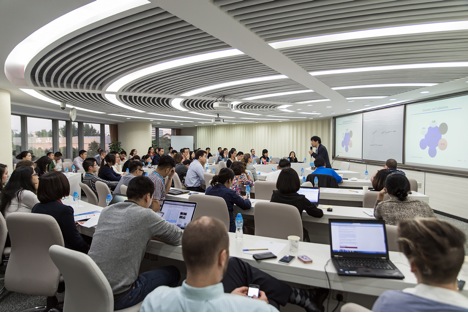With Chinese firm Alibaba set to create history this week with the largest IPO ever in the US, western media outlets have struggled to define exactly what the group is. The Chinese Amazon? eBay? PayPal? Or perhaps a combination of all three? The answer according to Alibaba founder and CKGSB alumnus Jack Ma is that while Amazon and eBay are e-commerce companies, Alibaba merely helps others to do e-commerce.
But it’s still a profitable business.
The day before the IPO listing, CKGSB Professor of Finance Chen Long, fresh off a trip to Alibaba’s headquarters in Hangzhou, gave a talk on internet finance and mobile payments at CKGSB’s Beijing campus in which he revealed that Alibaba’s valuation has grown from an estimated $35.5 billion dollars in May 2012 to a projected range of $170-200 billion dollars today.

[Prof Chen Long spoke to an audience at CKGSB’s Beijing campus on September 17]
The growth is staggering and Alibaba’s e-commerce revenues have already overtaken Amazon and eBay combined, but Ma said recently that he believes Alibaba’s finance arm, Alipay, will eventually grow to be worth more than the e-commerce arm, similar to the way that PayPal is on target to have greater revenues than eBay by 2017. With a recently restructured agreement allowing Alibaba a future share of Alipay’s profits, that could translate into several more billions for the company and its new investors.
Delving back into history, Prof Chen talked about the establishment of the first settlement and payment banks in Europe in the 16th century, before loan services were introduced in the 17th century. Chen then explained how the Bank of Amsterdam was replaced by the Bank of England in the 18th century after the Industrial Revolution saw first trade, then shipping and finally payment capabilities transferred from the Netherlands to the UK.
But Chen stressed that the nature of commerce and payment has not changed in the centuries since. “If you want to do commerce, you need to have payment”, Chen said. “But once you have payment abilities, you can offer a lot of additional services.”
In 2005, Yi Qu had more than 90% of the Chinese e-commerce market, but Alibaba was able to overtake Yi Qu after developing its own finance settlement system, Alipay, in 2004. In fact, Alipay only came into existence after China UnionPay turned down a proposed partnership with Alibaba, so the group was forced to develop its own system. That then allowed the group to branch out into different areas, such as launching online retail platform Tmall and Alipay’s online investment service Yu E Bao, both of which have flourished. “Without Alipay, there is no Taobao. It wouldn’t survive, ” Chen explained, referring to China’s largest consumer-to-consumer shopping platform, another of Alibaba’s successful arms.
Chen pointed out that many US companies are also getting into the payment sector, with Amazon, Google and Apple following the lead of China’s Big Three tech companies – Baidu, Alibaba and Tencent (BAT) – who have all ventured into finance. But Chen said he thought e-finance had a brighter future in China than in the US, specifically because both the internet and the finance sectors were less advanced in China, meaning that there was far more incentive to improve efficiency in the system – and to do so quickly. In contrast, a more mature system is more resistant to change, even if improvements are available.
Much has been made of the regulation set up to counter the rapid rise of e-finance in China, and, in response to a question from the lively audience at CKGSB, Prof Chen was critical of measures designed to protect traditional banking, which he said thwarted innovation. But Chen predicted that there will be plenty more lobbying between the two sides before the final rules are settled.
Chen maintains close links to Alibaba through the company’s Chief Strategy Officer Zeng Ming, a former Professor of Strategy at CKGSB, but cautioned about buying the stock once it’s available. “It’s not simply a question of investing in a great company. Buying the stock at a good price is another thing altogether,” said Chen.